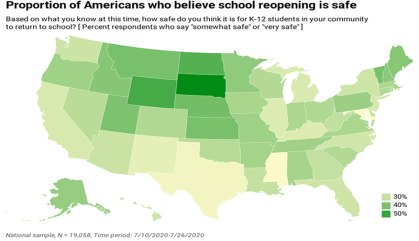Majority of Americans Not Confident in Safe Return to School, National Survey Says
Support for returning to in-person classes varies by gender, ethnicity, political affiliation

Nearly two-thirds of Americans do not believe it is safe for K-12 students to return to school, according to a new nationwide survey led by researchers from Rutgers University–New Brunswick, Northeastern, Harvard and Northwestern universities.
Only 31 percent of participants think returning to school is very safe or somewhat safe.
The survey, published by The COVID-19 Consortium for Understanding the Public’s Policy Preferences Across States, indicates that women, people with lower incomes, non-whites and Democrats are less likely to consider sending their children back to school this fall.
“Across the U.S., schools and parents are debating whether to choose face-to-face, online or hybrid learning for K-12 students this fall,” said co-author Katherine Ognyanova, an assistant professor of communication at Rutgers University–New Brunswick’s School of Communication and Information. “Each option has benefits and risks as both community health and quality education hang in the balance. Given the high uncertainty and regional differences, decisions are likely best made locally on a case-by-case basis.”
The survey found that the wealthiest people (with yearly household incomes of more than $200,000) are almost twice as likely as the least wealthy (with household incomes under $10,000) to express confidence in school safety (40 percent versus 22 percent).
Viewpoints about returning to school differed profoundly by party affiliation: 51 percent of Republicans but only 13 percent of Democrats and 24 percent of independents express support for reopening schools for in-person education.
Participants who intend to vote for President Trump in November, or indicated they trust the president with the COVID-19 crisis, are 55 percent and 50 percent likely, respectively, to support in-person classes, compared with 15 percent of respondents who do not intend to vote for Trump and 13 percent who do not trust the president to manage the pandemic well.
Ognyanova says communities of color, which are hit hard by the pandemic, are less likely to think school reopening is safe. Compared with African-American (13 percent), Hispanic (16 percent ) and Asian respondents (17 percent), white Americans are considerably more likely to support face-to-face education this fall (32 percent).
The researchers polled 19,058 people across all 50 states plus the District of Columbia between July 10 and 26.
The COVID-19 Consortium for Understanding the Public’s Policy Preferences Across States is a joint project of Rutgers University, Northeastern University, Harvard University and Northwestern University. The consortium has released 11 reports and has charted public opinion on COVID-19 related topics since late April.
For more information, visit: covidstates.org.